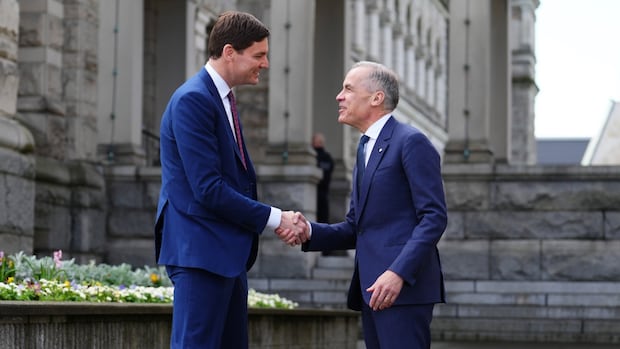Liberal Leader Mark Carney was in Victoria Monday, meeting with Premier David Eby to talk about strategies to protect B.C.’s softwood lumber industry.
Eby and Carney spent 20 minutes talking at the legislature during Carney’s visit to the province on week three of the federal campaign.
“We’ve got a lot to talk about today,” Eby told Carney as he welcomed him near the front steps of the legislature. “We got some bad news on tariffs for our softwood lumber industry.”
The bad news is that the U.S. plans to more than double the duty it charges on softwood lumber imports from Canada. The planned new rate will be set at 34 per cent, up from 14 per cent.
“This is another unjustified tariff. You can expect us to fight against it,” said Carney, at a news conference at Sea Cider Farm & Ciderhouse on the Saanich peninsula.
The forestry industry is bracing for higher duties amid the growing trade war between Canada and the U.S. It’s the latest blow to the battered sector, which has seen thousands of workers laid off over the last few years.
Carney said the increased duties could hurt more than 50,000 workers, and any government response has to have workers at its centre.

In a statement after the meeting with Carney, Eby said the two talked about the softwood lumber industry, reducing interprovincial trade barriers through a national transportation corridor for goods and services and expediting major infrastructure projects and affordable housing.
Eby said Trump’s “renewed assault on our forestry sector needs the same Team Canada response as the manufacturing and auto industry jobs in Ontario and Quebec. The prime minister confirmed his understanding of the seriousness of the softwood issue and his commitment to work with us to address it proactively.”
Forests Minister Ravi Parmar was more direct in his criticism of the federal government, saying it has been “absent” in its support for B.C.’s softwood lumber industry.
“What I understand was raised between the premier and the prime minister today is, if this was the auto sector, there would be more on the table,” Parmar told reporters after the meeting.
“We need the federal government and the prime minister to take this seriously. We need to ensure this is being given the same priority they’re giving the steel industry or the auto industry.”
Issue dominates question period
The issue of softwood lumber dominated question period on Monday, with the Official Opposition accusing the NDP of failing to protect jobs while offering nothing more than Liberal talking points.
“Will the premier please tell the people of B.C. what his new Liberal puppet master told him to say about this file?” B.C. Conservative Leader John Rustad asked.
Eby shot back that 10,000 forestry jobs were lost under the former B.C. Liberal government which the Opposition leader was part of. Rustad disputed the figures and CBC could not independently verify them.
Rustad said 30 sawmills have closed under the NDP’s watch, and businesses are moving to provinces where it’s less expensive to operate.
“We’ve seen no action from Ottawa or from this government for eight years,” he told reporters.

Rustad pushed the government to adopt his party’s proposal to charge a carbon tax on U.S. coal shipped out of B.C. ports, which could be used as leverage in softwood lumber negotiations.
Those in the logging industry want to see more specifics on what will be done to protect jobs in an already battered industry.

Mike Egli, who owns Dalchako Transport, a log hauling company in Vanderhoof, said the prospect of higher duties adds another layer of uncertainty.
Egli is worried it could lead to more mill closures, which would hurt his business.
Jeff Bromley, wood council chair for the United Steel Workers, which represents 14,000 workers in the forestry and manufacturing sector, said the union is bracing for layoffs.
“I hope I’m wrong, but I can’t see how companies could run with that kind of cost structure added to them.”
Bromley said when good paying “family supporting jobs” disappear, they’re near impossible to get back.
“We’ll still have a forestry industry in B.C. and across the nation when this thing is over, but there’s going to be a lot of pain coming in my opinion.”
